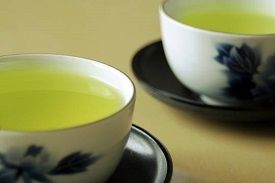- Home
- Better Memory
- Diet and Memory
- Green Tea Benefits
Green Tea Benefits: Enhanced Memory Formation, Better Working Memory, and Protection from Alzheimer's Dementia
Did you know green tea benefits include better memory and protection from Alzheimer's dementia?
Green tea is acclaimed for its anti-cancer and cardiovascular properties. Studies now suggest the brain is also helped by regular doses of this powerful superfood.
How does green tea strengthen your brain? Evidence reveals chemicals in green tea stimulate new cell formation in memory areas of the brain. Not only that, these substances also directly boost working memory.
If that isn't enough, green tea has been shown to block harmful proteins in Alzheimer's disease that cause memory loss.
These revelations may seem like bitter medicine if you don't enjoy drinking tea. Some people don't like tea's woody taste. But you can get used to green tea, as I did. I drink a cup or two of green tea every day (Bigelow Green Tea and Kirkland Signature brand,
are popular and affordable, there are others).
I usually drink my green tea unsweetened and add lemon juice. The lemon juice is important. According to research, the citric acid in lemon juice can triple your body's absorption of powerful catechin antioxidants in green tea.
If you already enjoy tea, taste isn't an issue. But if it is, consider that cup of tea as brain medicine, and drink it anyway. Or, take
green tea extract in the form of a pill along with your other vitamins.
Green Tea Boosts Neurogenesis and Working Memory
Green tea benefits have already been shown through research to include fighting cancer and improving heart health. But studies indicates green tea can also boost memory formation and facilitate memory processing. Here's how.
First, an organic molecule in green tea known as EGCG (scientific name, epigallocatechin-3 gallate) has been discovered to increase neurogenesis in memory-formation structures of the brain. Neurogenesis is the process of brain cell formation.
Researchers in China have reported EGCG spurs the creation of brain cells in the hippocampus. The hippocampus is the primary structure in the brain responsible for processing information from short-term memory and long-term memory.
This enhanced hippocampal neurogenesis leads directly to improvements in learning and memory.
Second, green tea appears to increase neuroplasticity in other parts of the brain. Neuroplasticity means an increase in connectivity between existing brain cells.
Researchers in Switzerland found green tea extract increased neuroplasticity between the parietal and frontal areas of the brain of human volunteers. In particular, working memory was strengthened.
Working memory represents the information you can hold in mind and manipulate at one time. It is considered a key to learning and intelligence.
So, green tea benefits your memory in at least two ways, due to its stimulating effect on:
Creation of new brain cells in the hippocampus
Interconnection between frontal and parietal brain cells.
Given these two incredible memory-related benefits of green tea, I hope you've already committed to drinking at least one cup a day. Green tea has been a favorite drink in China for generations. Today we know they really were really onto something.
TIP: On days when you tire of green tea, try a cup of peppermint tea instead. Peppermint tea has been shown to boost alertness and mood.
Green Tea Protects Your Brain vs. Dementia, Too
Due to its powerful antioxidant properties, green tea is already suspected to provide strong protective effects for the brain. That's because antioxidants vacuum up harmful free radicals that can damage brain cells.
But green tea may also ward off Alzheimer's-related memory loss in two more-direct ways.
One sign of Alzheimer's is the presence of unusually high levels of AChE (acetylcholinesterase) in the person's brain. AChE breaks down the neurotransmitter acetylcholine, an important chemical messenger. Studies show compounds in green tea thwart the action of AChE. In this way green tea may slow down the progression of dementia in Alzheimer's disease.
Amyloid plaques and protein tangles created by Alzheimer's disease lead to brain cell death by the millions over time. Scientists now believe green tea inhibits beta-secretase, a substance that contributes to the formation these harmful proteins in the brain. That's the second way green tea may protect the brain against Alzheimer's.
Thus, drinking green tea may protect against Alzheimer's dementia in at least three ways:
Provides antioxidant protection against damaging free radicals.
Boosts acetylcholine in the brain by inhibiting acetylcholinesterase (AChE).
Prevents brain cell damage from amyloid proteins caused by Alzheimer's disease.
Wow, if that isn't enough to convince you to drink green tea, I don't know what could.
For even more protection against Alzheimer's memory loss, add coconut oil and MCT oil and turmeric spice to your diet as well.
With every sip of green tea, memory formation may occur more easily. Your working memory, so critical in learning and problem solving, may improve. And you get triple protection against Alzheimer's dementia.
Green tea benefits your brain in so many ways. All those memory boosters in one little cup!
HOW I PREPARE GREEN TEA. I keep things simple. Each evening, I put 4 bags of instant green tea in a pitcher of water in the refrigerator, allowing this to steep overnight. Then I drink the cold green tea during the day in place of water. Yes, a pitcher a day.
To avoid overloading on caffeine, I'll sometimes substitute with the decaf variety. And to avoid consuming sugar and harsh chemicals, I've learned to drink green tea without any sweetener. Some lemon juice and/or a dash of non-fat milk is a simple solution to make it more palatable.
[+] References for Green Tea Benefits
Published: 06/05/2014
Last Updated: 06/11/2020

New / Popular
Multiplayer
Board Games
Card & Tile
Concentration
Math / Memory
Puzzles A-M
Puzzles N-Z
Time Mgmt
Word Games
- Retro Flash -
No sign-up or log-in needed. Just go to a game page and start playing! ![]()
100 Free Puzzle Printables:
Sudoku / Word Search










